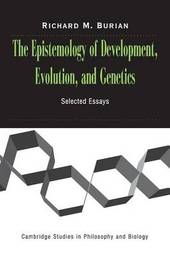
|
The Epistemology of Development, Evolution, and Genetics
Paperback / softback
Main Details
| Title |
The Epistemology of Development, Evolution, and Genetics
|
| Authors and Contributors |
By (author) Richard Burian
|
| Series | Cambridge Studies in Philosophy and Biology |
|---|
| Physical Properties |
| Format:Paperback / softback | | Pages:290 | | Dimensions(mm): Height 229,Width 152 |
|
| Category/Genre | Genetics (non-medical) |
|---|
| ISBN/Barcode |
9780521545280
|
| Classifications | Dewey:576 |
|---|
| Audience | | Professional & Vocational | |
|---|
| Illustrations |
8 Halftones, unspecified; 8 Line drawings, unspecified
|
|
Publishing Details |
| Publisher |
Cambridge University Press
|
| Imprint |
Cambridge University Press
|
| Publication Date |
15 November 2004 |
| Publication Country |
United Kingdom
|
Description
Collected for the first time in a single volume are essays which examine the developments in three fundamental biological disciplines - embryology, evolutionary biology, and genetics. These disciplines were in conflict for much of the twentieth century and the essays in this collection examine key methodological problems within these disciplines and the difficulties faced in overcoming the conflicts between them. Burian skilfully weaves together historical appreciation of the settings within which scientists work, substantial knowledge of the biological problems at stake and the methodological and philosophical issues faced in integrating biological knowledge drawn from disparate sources. The final chapter describes what recent findings in development biology and genetics can tell us about the history and development of animals. Written in a clear, accessible style this collection should appeal to students and professionals in philosophy of science, and the philosophy and history of biology.
Author Biography
Richard M. Burian is Professor of Philosophy and Science Studies at Virginia Polytechnic Institute and State University.
Reviews"for those willing to invest some time, the rewards of this volume are considerable: Burian presents a nuanced account of a number of important developments in 20th century biology." - Todd Grantham, College of Charleston
|